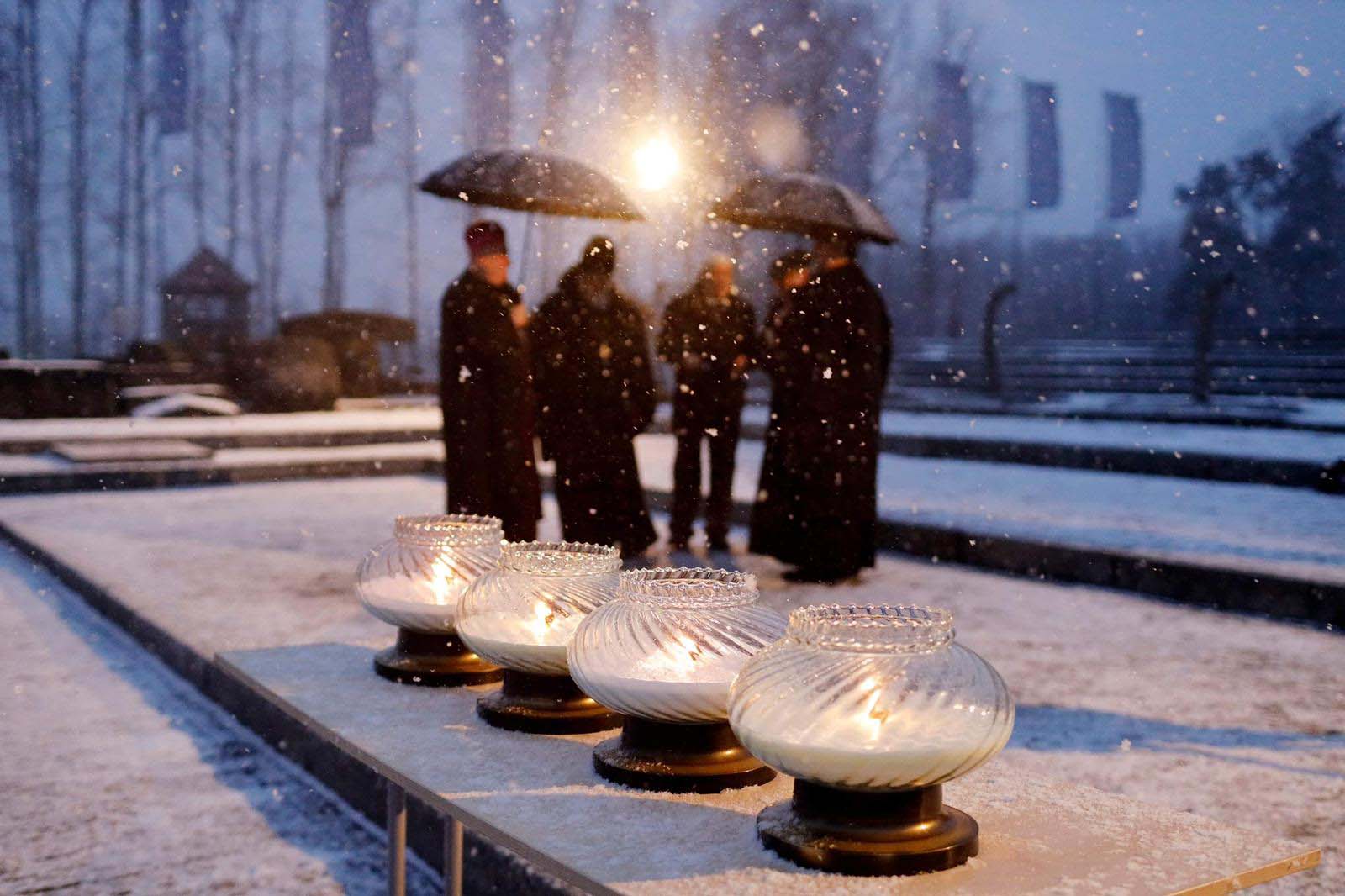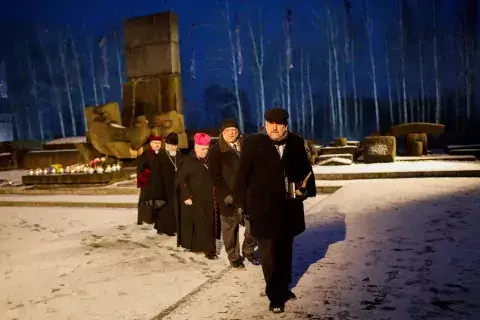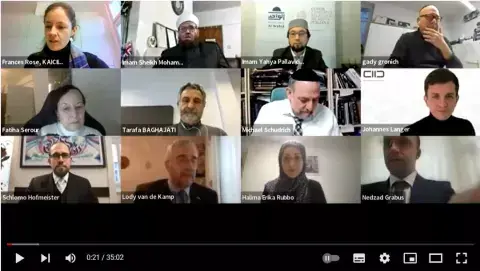
At a time of increased anti-Semitism, anti-Muslim hate, and xenophobia in Europe, it is a powerful moment when a rabbi and an imam stand side-by-side in solidarity, with Holocaust survivors, one another, and on behalf of Europe’s Jews and Muslims.
On Thursday, 27 January Rabbi Michael Schudrich, Chief Rabbi of Poland and Imam Adham Abd El Aal, representative of the Grand Mufti of Poland in Warsaw, did just that at the International Holocaust Remembrance Day (IHRD) ceremonies at Auschwitz-Birkenau, a Nazi death camp where more than 1.1m people, mostly Jews, were killed.
The pair are part of the Muslim Jewish Leadership Council-Europe (MJLC), a KAICIID-facilitated organization founded to serve the need to free members of religious minorities from prejudice, false claims, discrimination, and violence.
Seventeen years ago, on 1 November 2005, the United Nations (UN) General Assembly designated 27 January as IHRD. The yearly commemoration marks the liberation of Auschwitz-Birkenau in 1945 and is meant to remember and honor Nazism’s many victims. It is also intended to educate people about the Holocaust, prevent further genocide, and denounce all forms of “religious intolerance, incitement, harassment or violence against persons or communities based on ethnic origin or religious belief.”
Due to the ongoing COVID-19 pandemic, this year’s IHRD ceremony at Auschwitz-included only a handful of guests, mostly survivors and local leaders from the religious and political spheres. Among those who gathered at the memorial in Birkenau were Rabbi Michael Schudrich, Chief Rabbi of Poland, Imam Adham Abd El Aal, representative of the Grand Mufti of Poland in Warsaw, the Roman-Catholic Bishop Roman Pindel, the Orthodox Bishop Atanzy and Bishop Adrian Korczago from the Polish Evangelical-Augsburg Church.
On the importance of the MJLC’s presence at the event, Schudrich said, “What happened in Auschwitz was a Jewish tragedy. It was a human tragedy. But all of humanity needs to learn the lesson: the world cannot be silent when mass murder and genocide has taken place. Therefore, we must speak out together. It’s our responsibility,” he said.

Established in 2015, the MJLC is the first European platform for Muslim and Jewish leaders to proactively advocate the protection of religious freedom in Europe.
Chaired by Rabbi Pinchas Goldschmidt, Chief Rabbi of Moscow, and Mufti Nedzad Grabus, Mufti of Sarajevo, the MJLC aims “to renew in Europe a culture of respect and appreciation of religious identities, specifically Judaism and Islam”. That work is not only necessary, Schudrich said, but natural.
“The MJLC is the most natural organization you could imagine should exist,” he said, “Jews and Muslims have lived peaceably with each other for hundreds of years. It’s only logical that Jews and Muslims work together in Europe, identifying common issues we face and highlighting the things we can do together to fight marginalization.”
Prevented by COVID-19 regulations from sending a larger delegation to the commemoration ceremony this year, MJLC members from 16 countries gathered instead for an online meeting where the European imams and rabbis offered prayers and a statement of solidarity in support of their Polish members and their mission.
“We must never forget that it all started with hate speech and ended with genocide. Remembering our common Abrahamic roots, we stand up together against discrimination and join hands in our fight against Islamophobia and Anti-Semitism", Imam Tarafa Baghajati, an MJLC Board member from Austria, stated this morning during a virtual interfaith prayer meeting organized by the Council.

Schudrich said the work of the MJLC is “so important because there is this image that Muslims and Jews can’t get along together today. That’s absolutely false.”
“We want people to see Muslim-Jewish relationships in a new light,” added Abd El-Aal, “to empower those who want to build bridges and be in contact with one another.”
With rising levels of anti-Semitism and Islamophobia across the continent, such work is urgent. As Council of Europe special representative Dr Daniel Höltgen recently wrote:
"The year 2021 was alarming for Jews in Europe. Anti-Semitism escalated in May as violence in the Gaza war flared up. In Germany, synagogues were attacked and Israeli flags burned. Similar anti-Semitic incidents took place elsewhere, and online threats against Jews skyrocketed."
Likewise, the Bridge Initiative at Georgetown University reported that Islamophobia and anti-Muslim racism remain constant and growing threats in Europe and around the globe.
Over the last three years, the MJLC has enabled information exchange about local and national communities’ needs, concerns, challenges and the day-to-day experience of living as a minority religious identity in Europe.
That work has included everything from coalition building workshops to advocating for religious freedom protections in the face of potential prohibitions against certain forms of ritual slaughter. The MJLC has also released statements to honor the victims of various xenophobic attacks, such as in Halle, Germany in October 2019 or when Muslim gravesites were desecrated in Slovenia in 2021.
“Whenever something happens in Europe — against Jews or Muslims — the MJLC is there to make a statement and make a statement together,” Schudrich said, “whatever we do, we do it together.”
Abd El Aal said, “When there is any injustice, no matter who it is, whenever someone wants to stand up against it, they will have me beside them.
“Wherever injustice is, we cannot be afraid to confront it — to stand up and say, ‘no, never again!’” he said.
The remembrance event at Auschwitz-Birkenau presents a prime opportunity — and a symbolic setting — to do this kind of work. Not only do Rabbi Schudrich and Imam Abd El Aal want to honor victims and survivors, they also want to send a clear message that hate, xenophobia, and intolerance are not welcome in Europe. The dual horizon of hate in Europe came into sharp focus at Auschwitz-Birkenau earlier this week. Polish police reported that a Dutch tourist was arrested, detained, and fined for making a Nazi salute while posing for photos in front of the infamous camp gate inscribed with "Arbeit macht frei.”
Schudrich told CNN “The very least we can do to honor the memory of all those killed by the German Nazi regime is to have zero tolerance for fascism, hate and xenophobia.”
Auschwitz-Birkenau “is not a place meant only for Jewish people,” said Abd El Aal, “it’s a place of remembrance and education, a place for all to say, ‘this can’t happen again.’”
“All of humanity needs to learn the lessons: the world cannot be silent when mass murder and genocide has taken place. If we’ve learned anything from the Holocaust, it is that we cannot be silent,” Schudrich agreed.
Having worked together at conferences and on projects in the past — like helping the Polish prison system provide kosher and halal food options for inmates — Rabbi Schudrich and Imam Abd El Aal hope their shared presence at Auschwitz-Birkenau on 27 January sent such a clear message.
This summer, members of the MJLC plan to gather for Srebrenica Memorial Day to express religious solidarity in the face of the atrocities committed against thousands of Muslim victims in 1995.
“The MJLC is there to help facilitate that conversation. For the average Muslim and Jew to see rabbis and imams doing work together,” Schudrich said.
While Schudrich and Abd El Aal believe the MJLC’s work is imperative, they also hope its work will someday seem less remarkable.
“It’s my dream that in a few years that the MJLC will be a normal organization, that nobody will want to photograph an imam and a rabbi taking a stand together,” Schudrich said, “that’s the future of Europe I hope for.”
For now, Schudrich and Abd El Aal said, that work means standing side-by-side with survivors at Auschwitz-Birkenau on International Holocaust Remembrance Day.